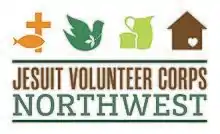Jesuit Volunteer Corps Northwest
Jesuit Volunteer Corps (JVC) Northwest connects people with one or more years of volunteer service that focus on JVC Northwest's values of community, spirituality, simple living and social and ecological justice. JVC Northwest provides opportunities for individuals to reach out to persons living on the margins of society and vulnerable places throughout the Pacific Northwest. Jesuit Volunteers live and serve with partner agencies in Alaska, Idaho, Montana, Oregon and Washington.

History
Jesuit Volunteer Corps Northwest started in 1956 with several committed volunteers who built and taught in the newly formed Copper Valley School for Alaska Native and non-Native children. Under the sponsorship of the Oregon Province of the Society of Jesus (Jesuits), the Jesuit Volunteers expanded out of Alaska in the 1960s. They began living and working with Native American communities throughout the Northwest region, as well as serving in inner city placements in Washington and Oregon and beyond. From its roots in the Northwest, the Jesuit Volunteer Corps has spread throughout the United States and abroad. Over the past 50 years over 12,000 individuals have served as Jesuit Volunteers through JVC and JVC Northwest, with more than 7,000 of those serving in the Northwest.[1]
In 2009, five of the six Jesuit Volunteer Corps organizations merged to form an organization called Jesuit Volunteers to share resources for one common mission. JVC Northwest made a decision to remain an independent region when the East, Midwest, South and Southwest regions, along with Jesuit Volunteers International, made a decision to unite. Both groups continue to collaborate. JVC Northwest states its commitment to providing well-supported volunteers to address the most urgent needs in the Pacific Northwest.
Values
JVC Northwest has four stated values: community, simple living, social and ecological justice, and spirituality/reflection. Jesuit Volunteers make a commitment to the JVC Northwest program and to their service placements to strive to live these four values.
Community: JVs live with one another in a community setting. The process of building community offers an opportunity to share experience, faith and hope. People come to JVC Northwest with diverse backgrounds and expectations. The challenge for each person is to respect and learn from these differences while building on common values. Community requires time, effort and sacrifice, while giving back many wonderful, unexpected gifts. Volunteer communities are places to share and grow collectively and individually. Living in community often marks the beginning of lasting friendships.
Simple Living: JVC Northwest challenges each volunteer to live a simple and reflective lifestyle, an alternative way to living in a consumer society. JVC Northwest stresses spiritual values over material possessions and invites volunteers to integrate their faith by working and living among those who experience poverty and oppression. This helps volunteers to experience the lives of those with whom they interact on a daily basis and to raise their consciousness to the human needs surrounding them. Often, volunteers find that living simply opens them up to a more joyful way of life, appreciating small wonders that often go unnoticed in everyday life.
Social and Ecological Justice: JVC Northwest is committed to working for social and ecological justice and structural change through faith. Volunteers work with others dedicated to serving people's basic physical, emotional and spiritual needs. JVC Northwest encourages and nurtures the empowerment of people who live on the margins of society by supporting programs allowing people to help themselves. Through work and reflection on lived experiences, JVs examine the causes of oppression and look for ways to bring about justice in our world.
Spirituality: A vital aspect of the JVC Northwest year is the opportunity for the volunteers to explore and deepen their spiritual lives. Their journey is part of a lifelong process that can be both comforting and unsettling, joyous and painful. The volunteers are "contemplatives in action" - women and men who are committed to the Gospel, integrating faith and working for justice. Because the volunteers live in community, they have the opportunity to reflect and pray with other committed Christians and people of faith, and to participate in liturgical celebrations. The expression of spirituality, which grows out of work for justice and living Gospel values, makes volunteers part of an active and prophetic church.